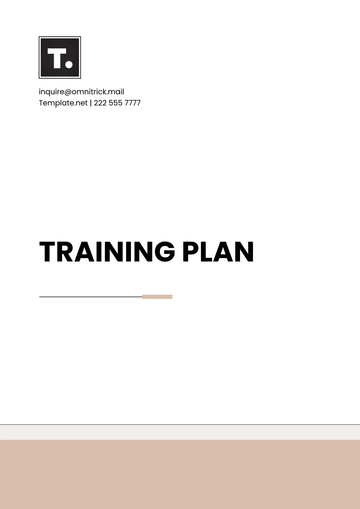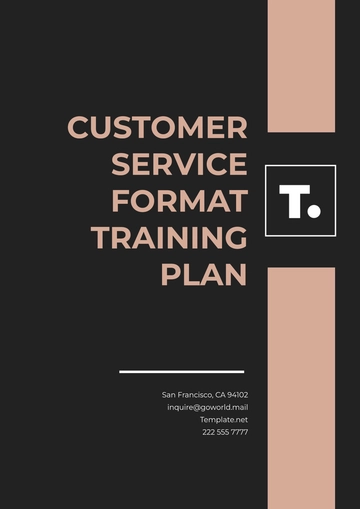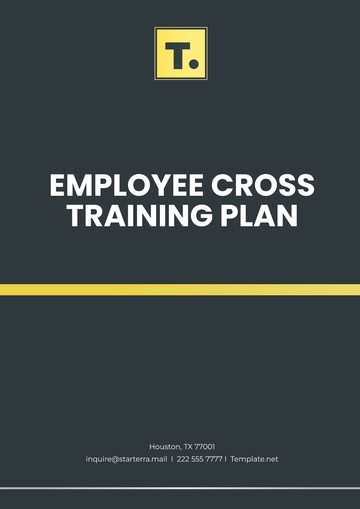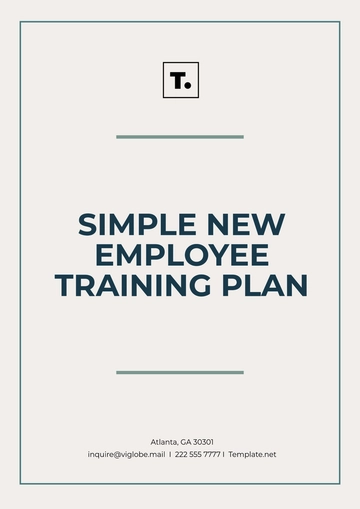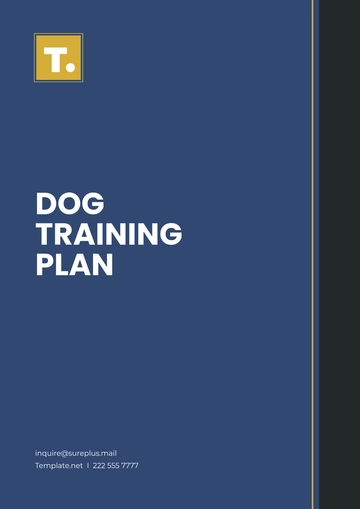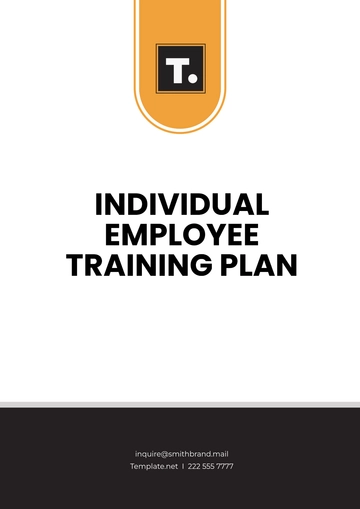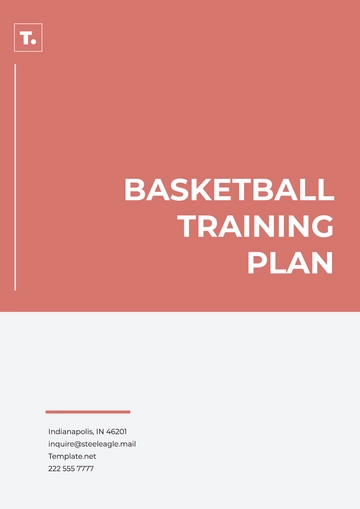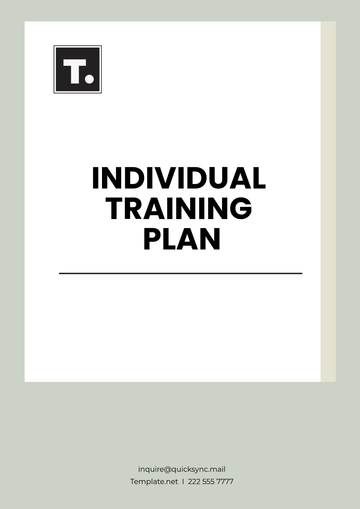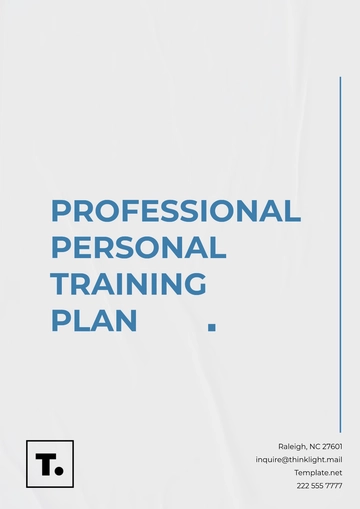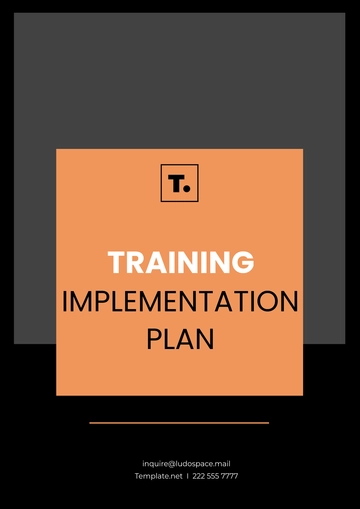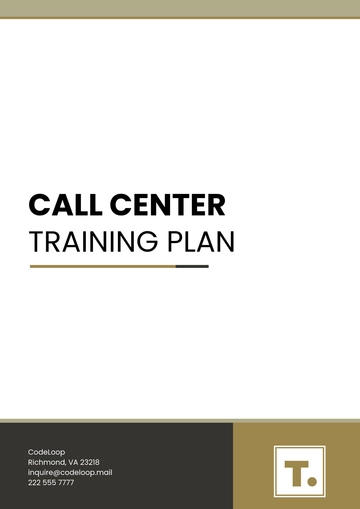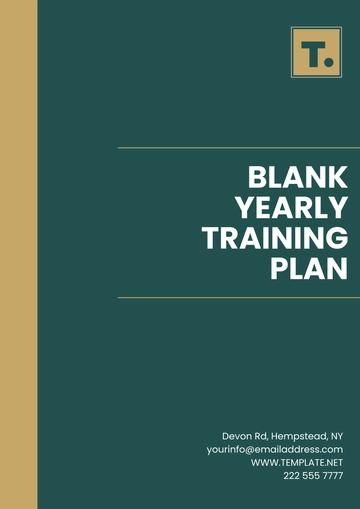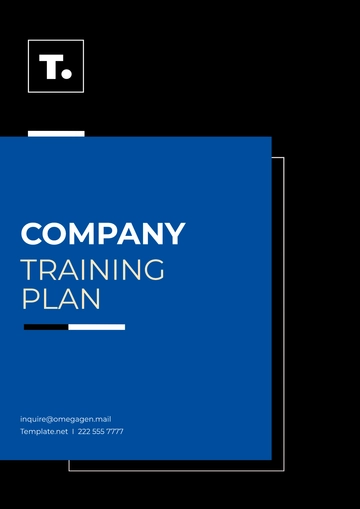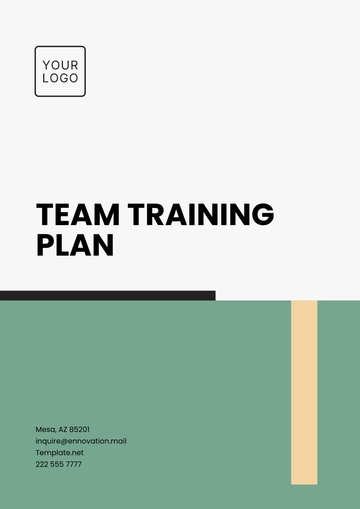Free Soccer Training Plan
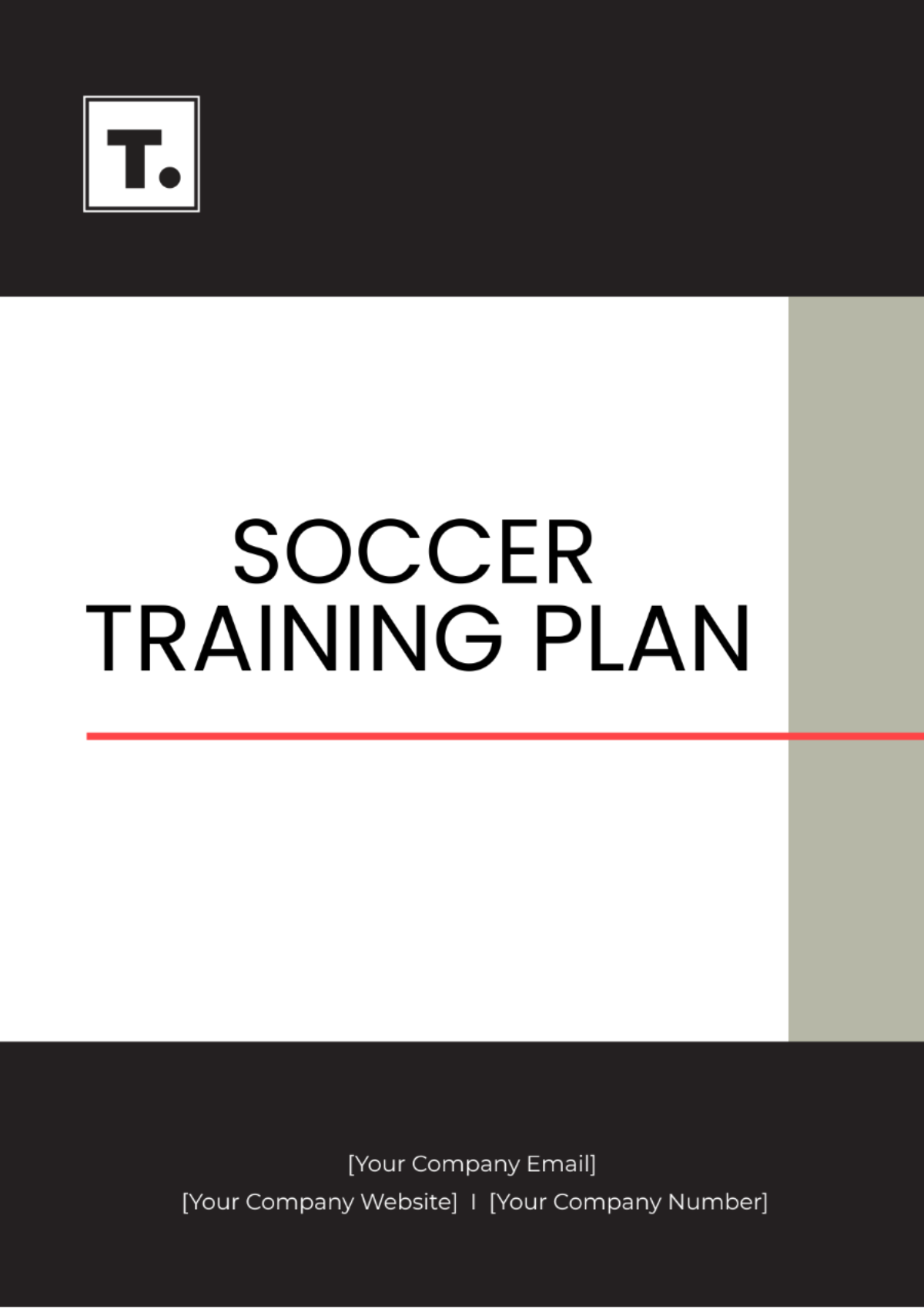
Written by: [YOUR NAME]
I. Introduction
This Soccer Training Plan is designed to enhance the team development of [TEAM NAME] by focusing on improving various aspects of technical skills, tactical understanding, physical fitness, and mental preparation. By following this structured plan, [TEAM NAME] aims to strengthen teamwork, communication, and overall performance on the field.
II. Training Objectives
Enhance Team Cohesion: Foster a strong sense of unity and camaraderie among players to improve on-field communication and collaboration.
Improve Tactical Understanding: Enhance players' comprehension of team formations, strategies, and positional play to adapt effectively during matches.
Develop Technical Skills: Refine fundamental skills such as dribbling, passing, shooting, and ball control to increase player effectiveness in various game situations.
Enhance Physical Fitness: Improve players' endurance, strength, speed, and agility to meet the demands of high-intensity matches and minimize the risk of injuries.
Foster Mental Resilience: Equip players with mental strategies to maintain focus, confidence, and composure under pressure, enhancing their overall performance on the field.
III. Training Schedule
Week | Activity | Date | Time |
|---|---|---|---|
1: Pre-Season | Pre-Season Preparation | March 1, 2050 | 9:00 AM - 12:00 PM |
2-4 | Technical Skills Development | March 5 - March 26 | 3:00 PM - 6:00 PM |
5-8 | Tactical Understanding and Teamwork | April 2 - April 23 | 3:00 PM - 6:00 PM |
9-12 | Physical Conditioning and Fitness | May 1 - May 22 | 3:00 PM - 6:00 PM |
13-16 | Mental Preparation and Game Simulation | May 29 - June 19 | 3:00 PM - 6:00 PM |
IV. Training Sessions
Session | Date | Focus Areas | Drills |
|---|---|---|---|
1: Technical | March 5 | Dribbling, Passing, Ball Control | Cone Dribbling, Passing Square, Control and Turn |
2: Tactical | April 9 | Positioning, Pressing, Transition Play | Small-Sided Games, Tactical Scenarios |
3: Physical | May 15 | Endurance, Strength, Agility | Interval Running, Circuit Training, Plyometrics |
4: Mental | June 11 | Focus, Confidence, Adaptability | Visualization, Goal Setting, Stress Management |
V. Match Analysis and Feedback
After each match, a thorough analysis will be conducted by the coaching staff and analysts to evaluate various aspects of the team's performance. This analysis will include:
Reviewing match footage to assess player positioning, decision-making, and execution of tactics.
Analyzing statistical data such as possession percentage, shots on target, passing accuracy, and defensive actions.
Identifying patterns of play, strengths, weaknesses, and areas for improvement.
Providing individualized feedback to players based on their performance during the match.
Discussing tactical adjustments and strategies for upcoming matches.
Feedback sessions will be conducted with players to discuss the analysis findings and provide constructive feedback. These sessions will serve as opportunities for players to reflect on their performance, address any concerns, and set goals for improvement.
VI. Individual Player Development Plans
Customized development plans will be created for each player following assessments of their strengths, weaknesses, and areas for improvement. These plans will include:
Specific technical skills and tactical concepts to focus on during training sessions.
Individualized drills and exercises to target areas needing improvement.
Performance goals and objectives to track progress over time.
Recommendations for additional training or conditioning outside of regular team sessions.
Regular reviews and adjustments to the development plans based on ongoing assessments and feedback.
By tailoring development plans to each player's unique needs and goals, we aim to maximize their potential and contribute effectively to the team's success.
VII. Injury Prevention and Rehabilitation
Injury prevention is a key priority to ensure players remain fit and available for matches throughout the season. Our injury prevention program includes:
Pre-training warm-up routines to prepare muscles and joints for physical exertion.
Strength and conditioning exercises targeting areas prone to injury, such as the lower limbs and core.
Education on proper technique and biomechanics to reduce the risk of overuse injuries.
Monitoring of training loads and intensity to prevent overtraining and fatigue.
Access to medical and physiotherapy support for timely diagnosis and treatment of injuries.
In the event of an injury, players will receive personalized rehabilitation plans designed to facilitate a safe and efficient return to play. These plans may include:
Graduated exercises to restore strength, mobility, and proprioception.
Individualized treatment modalities such as manual therapy, massage, and electrotherapy.
Progression through functional movement patterns and sport-specific drills.
Collaboration with medical professionals to ensure a comprehensive approach to rehabilitation.
VIII. Nutrition and Hydration Guidelines
Proper nutrition and hydration are essential for optimizing performance, recovery, and overall well-being. Our nutrition and hydration guidelines include:
Individualized meal plans tailored to meet the energy demands of training and matches.
Recommendations for nutrient timing to support muscle recovery and glycogen replenishment.
Hydration strategies to maintain optimal fluid balance before, during, and after exercise.
Education on the importance of nutrient-rich foods such as lean proteins, complex carbohydrates, fruits, and vegetables.
Monitoring of hydration status and electrolyte levels during training and matches.
By prioritizing proper nutrition and hydration, we aim to enhance players' physical readiness and resilience on the field.
IX. Communication and Team Building Activities
Effective communication and team cohesion are vital for fostering a positive and supportive team environment. We will organize a variety of communication and team-building activities, including:
Regular team meetings to discuss tactics, goals, and feedback.
Team-building exercises such as trust falls, problem-solving challenges, and group discussions.
Bonding activities outside of soccer, such as team dinners, movie nights, and community service projects.
Leadership development workshops to empower players to take on leadership roles within the team.
Open channels of communication between players, coaches, and support staff to address any concerns or issues.
These activities will strengthen relationships, build trust, and promote a cohesive team culture centered around shared values and goals.
X. Conclusion
By diligently following this Soccer Training Plan, [TEAM NAME] will be well-prepared to achieve its goals for the season. Through a combination of technical proficiency, tactical acumen, physical fitness, and mental resilience, the team will strive for success on and off the field.
- 100% Customizable, free editor
- Access 1 Million+ Templates, photo’s & graphics
- Download or share as a template
- Click and replace photos, graphics, text, backgrounds
- Resize, crop, AI write & more
- Access advanced editor
Boost your soccer training regimen with the customizable and editable Soccer Training Plan Template from Template.net. This template, designed for coaches and players, offers comprehensive drills and exercises. Utilize the AI Editor Tool for effortless personalization, ensuring each session meets your needs. Elevate your team's performance with this efficient and user-friendly training solution.
You may also like
- Finance Plan
- Construction Plan
- Sales Plan
- Development Plan
- Career Plan
- Budget Plan
- HR Plan
- Education Plan
- Transition Plan
- Work Plan
- Training Plan
- Communication Plan
- Operation Plan
- Health And Safety Plan
- Strategy Plan
- Professional Development Plan
- Advertising Plan
- Risk Management Plan
- Restaurant Plan
- School Plan
- Nursing Home Patient Care Plan
- Nursing Care Plan
- Plan Event
- Startup Plan
- Social Media Plan
- Staffing Plan
- Annual Plan
- Content Plan
- Payment Plan
- Implementation Plan
- Hotel Plan
- Workout Plan
- Accounting Plan
- Campaign Plan
- Essay Plan
- 30 60 90 Day Plan
- Research Plan
- Recruitment Plan
- 90 Day Plan
- Quarterly Plan
- Emergency Plan
- 5 Year Plan
- Gym Plan
- Personal Plan
- IT and Software Plan
- Treatment Plan
- Real Estate Plan
- Law Firm Plan
- Healthcare Plan
- Improvement Plan
- Media Plan
- 5 Year Business Plan
- Learning Plan
- Marketing Campaign Plan
- Travel Agency Plan
- Cleaning Services Plan
- Interior Design Plan
- Performance Plan
- PR Plan
- Birth Plan
- Life Plan
- SEO Plan
- Disaster Recovery Plan
- Continuity Plan
- Launch Plan
- Legal Plan
- Behavior Plan
- Performance Improvement Plan
- Salon Plan
- Security Plan
- Security Management Plan
- Employee Development Plan
- Quality Plan
- Service Improvement Plan
- Growth Plan
- Incident Response Plan
- Basketball Plan
- Emergency Action Plan
- Product Launch Plan
- Spa Plan
- Employee Training Plan
- Data Analysis Plan
- Employee Action Plan
- Territory Plan
- Audit Plan
- Classroom Plan
- Activity Plan
- Parenting Plan
- Care Plan
- Project Execution Plan
- Exercise Plan
- Internship Plan
- Software Development Plan
- Continuous Improvement Plan
- Leave Plan
- 90 Day Sales Plan
- Advertising Agency Plan
- Employee Transition Plan
- Smart Action Plan
- Workplace Safety Plan
- Behavior Change Plan
- Contingency Plan
- Continuity of Operations Plan
- Health Plan
- Quality Control Plan
- Self Plan
- Sports Development Plan
- Change Management Plan
- Ecommerce Plan
- Personal Financial Plan
- Process Improvement Plan
- 30-60-90 Day Sales Plan
- Crisis Management Plan
- Engagement Plan
- Execution Plan
- Pandemic Plan
- Quality Assurance Plan
- Service Continuity Plan
- Agile Project Plan
- Fundraising Plan
- Job Transition Plan
- Asset Maintenance Plan
- Maintenance Plan
- Software Test Plan
- Staff Training and Development Plan
- 3 Year Plan
- Brand Activation Plan
- Release Plan
- Resource Plan
- Risk Mitigation Plan
- Teacher Plan
- 30 60 90 Day Plan for New Manager
- Food Safety Plan
- Food Truck Plan
- Hiring Plan
- Quality Management Plan
- Wellness Plan
- Behavior Intervention Plan
- Bonus Plan
- Investment Plan
- Maternity Leave Plan
- Pandemic Response Plan
- Succession Planning
- Coaching Plan
- Configuration Management Plan
- Remote Work Plan
- Self Care Plan
- Teaching Plan
- 100-Day Plan
- HACCP Plan
- Student Plan
- Sustainability Plan
- 30 60 90 Day Plan for Interview
- Access Plan
- Site Specific Safety Plan
